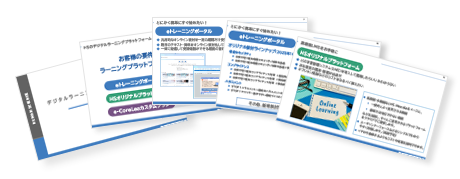2023.09.01
Are there any subsidies available for implementing e-learning?

With the changes brought about by work style reforms and the COVID-19 pandemic, remote work and telecommuting are becoming established. Along with this, there may be companies considering the transition of in-house training to online formats.
For online training, there are formats where instructors conduct live broadcasts at specific dates and times, as well as e-learning formats where participants can access and learn at their convenience.
In the former case, if there is an environment that can use devices or applications for online meetings, it can be implemented immediately. However, in the latter case, if we include the systems and devices used, as well as learning management, there are many decisions and preparations required before implementation.
Furthermore, it is also necessary to produce and arrange the actual learning materials.
In this way, starting e-learning requires consideration from the planning stage, establishing a system with responsible personnel, as well as costs for system implementation and material production.
Cost can be a bottleneck, and there may be times when progress towards implementing e-learning does not go as smoothly as hoped.
This time, I would like to focus on grants that could be one of the solutions in such cases.
1. Preparation and Costs for Implementing e-Learning
What preparations and costs are necessary when implementing e-learning?
●Creating an environment for education (system implementation, internal system development, etc.)
●Development of educational materials and training content
●Personnel costs for participants (wages for time spent on training, etc.)
Please refer to the following for preparations and considerations regarding the introduction of e-learning.
>What is e-Learning? An Overview of the System and Its Benefits
>What is the Best e-Learning Platform for Your Company? An Explanation of Features, Types, and Utilization Benefits!
It is necessary to assign personnel with specialized knowledge for system implementation or to request a vendor. Additionally, if you are building a server in-house, you must also arrange for equipment and applications.
It is also necessary to arrange for teaching materials and instructors (including those who supervise the materials).
Furthermore, wages will continue to accrue while employees are attending training.
For companies that are about to introduce e-learning, it can be quite a burden. Therefore, how about considering the use of subsidies?
2. Grant System for Education and Training
Here, we will introduce three types of grants from the national and local governments.
1. Human Resource Development Grant (Ministry of Health, Labour and Welfare)
2. IT Introduction Subsidy (Small and Medium Enterprise Agency)
3. Online Skill Improvement Grant (Tokyo Metropolitan Government)
1. Human Resource Development Support Grant
Related Sites: Human Resource Development Support Grant System (Ministry of Health, Labour and Welfare)The Human Resource Development Support Grant is a system that provides subsidies for training costs and a portion of wages during the training period when employers implement vocational training to help workers acquire specialized knowledge and skills related to their jobs, in accordance with a planned program. (Quoted from the Human Resource Development Support Grant System website)
Seven courses are set up, varying by content, method, purpose, and target audience.
① Human Resource Development Support Course
② Education and Training Leave Grant Course
③ Investment Promotion in People Course
④ Business Development Reskilling Support Course
⑤ Construction Worker Certification Training Course
⑥ Construction Worker Skills Training Course
⑦ Disability Vocational Ability Development Course
Among these, the ① Human Resource Development Support Course, ③ Investment Promotion Course for People, and ④ Business Expansion and Reskilling Support Course include training through e-learning as part of the subsidy eligibility.
Overview of the "Human Resource Development Support Course ①"
According to the 2023 Edition Brochure (Human Resource Development Support Course) Detailed Version, there are three requirements for the Human Resource Development Support Course.
If training related to job skills and knowledge is conducted according to the plan, a portion of the training costs and wages during the training period will be subsidized.
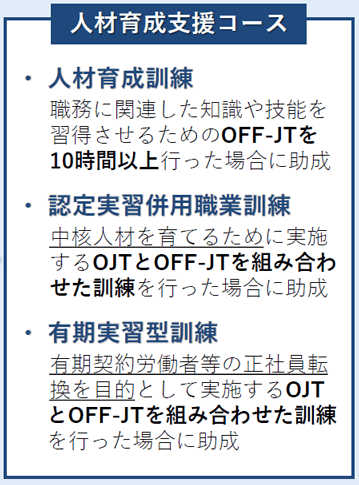
※Excerpt from the 2023 Edition Brochure (Human Resource Development Support Course) Detailed Version
For e-learning and distance education training, if the standard learning time, learning period, and content of the materials meet the requirements, they will be eligible for subsidies.
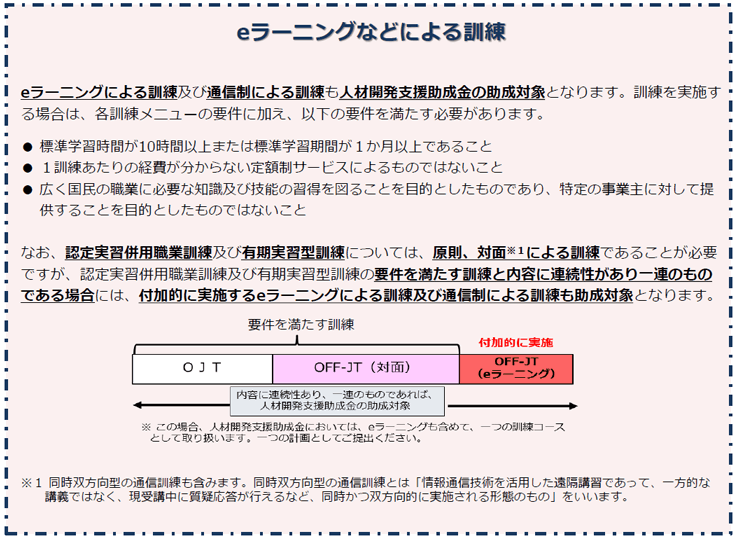
※Excerpt from the 2023 Edition Brochure (Human Resource Development Support Course) Detailed Version
The eligible expenses are as follows.
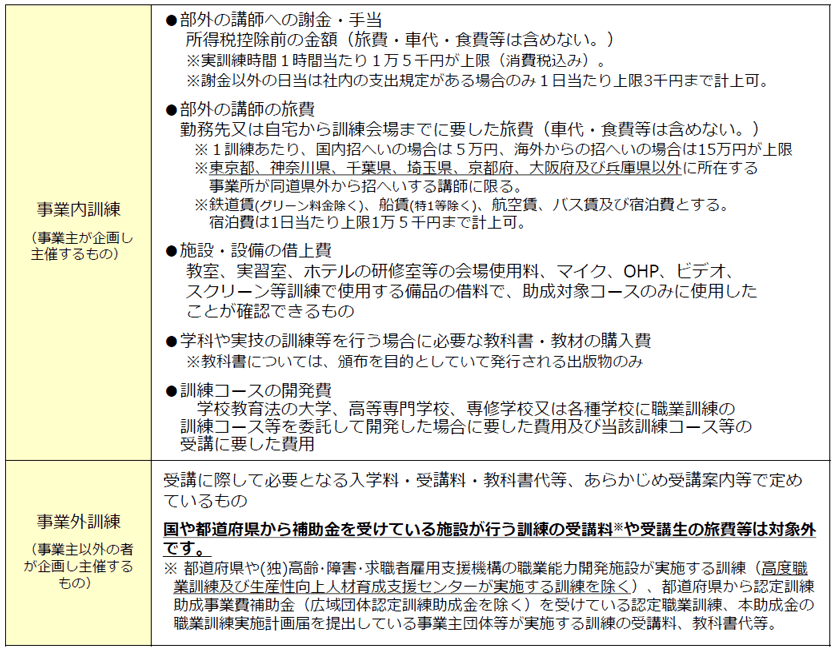
※Excerpt from the 2023 Edition Brochure (Human Resource Development Support Course) Detailed Version
In the case of e-learning, the following implementation methods are excluded. Additionally, regarding flat-rate services, there may be other courses that qualify for assistance.
● Training through e-learning and synchronous interactive communication training that is provided as a flat-rate service ● Not aimed at acquiring knowledge and skills necessary for the professions of the general public, but intended for specific employers (limited to training through e-learning and correspondence training).
In addition, expenses for reusable materials such as computer software and educational videos, as well as computers and peripherals that can be used generally outside of vocational training, are also excluded.
The grant amount and grant rate are determined as follows.
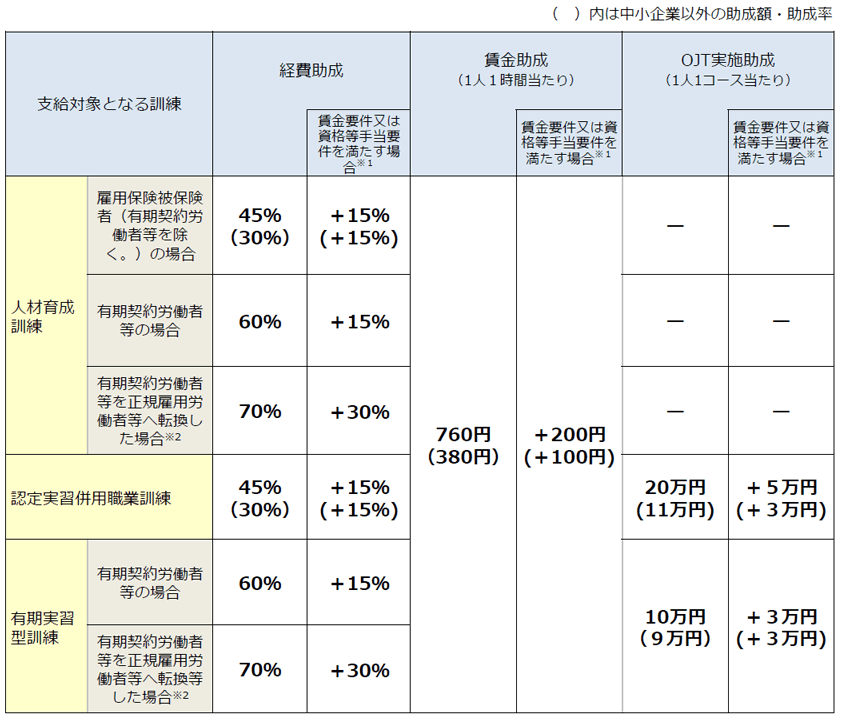
※Excerpt from the 2023 Edition Brochure (Human Resource Development Support Course) Detailed Version
The maximum grant amount is here.

※Excerpt from the 2023 Edition Brochure (Human Resource Development Support Course) Detailed Version
The maximum wage subsidy limit is 1,200 hours per person per training, and 1,600 hours for specialized practical education and training.
Additionally, there is a limit on the number of times one can attend, which is up to 3 times per worker per fiscal year.
The total subsidy that one business can receive in a fiscal year is 10 million yen.
In addition, there are requirements for employers and workers who can receive subsidies, so please check the Ministry of Health, Labour and Welfare's website or pamphlets for details.
Overview of the "Investment in People Promotion Course"
2023 Edition Brochure (Investment in People Promotion Course) Detailed Version states that this course has established five training programs as a limited-time subsidy from fiscal year 2022 to 2026 to accelerate "investment in people".

※Excerpt from the 2023 Edition Brochure (Human Investment Promotion Course) Detailed Version
In any training, e-learning is eligible for subsidies.
The subsidy rate is as follows.
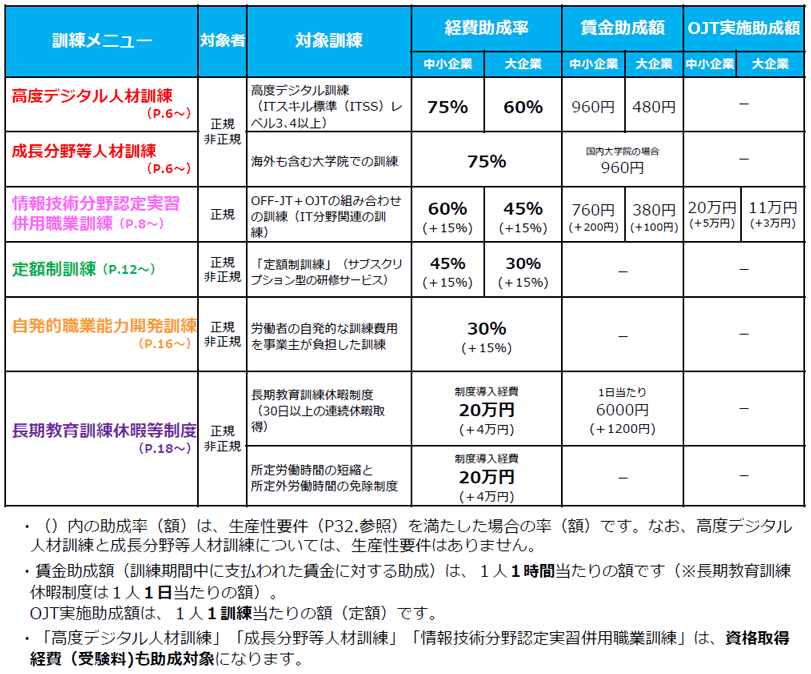
※Excerpt from the 2023 Edition Brochure (Human Investment Promotion Course) Detailed Version
The maximum grant amount is 25 million yen per business establishment per fiscal year (excluding training for human resources in growth sectors, and voluntary vocational skills development training is 3 million yen). The limit for training in growth sectors is 10 million yen.
Additionally, amounts per person, as well as the number of days, hours, and sessions, are also specified.
Among the five training options, the "Flat Rate Training" offers a subscription-based unlimited training service, which is eligible for subsidies.
At the time of applying for the subsidy, the individuals registered as training participants must complete at least one hour of the eligible training, with a total of at least 10 hours required for all participants combined.
By the way, regarding the flat rate training, rental fees for tablets and routers, as well as input agency services for LMS, are not eligible for subsidies, even though they are necessary expenses for participation.
In addition to fixed-rate training, there are conditions under which you can receive subsidies for other training through e-learning. Please check the Ministry of Health, Labour and Welfare's website or pamphlets for details.
Overview of the "Reskilling Support Course for Business Development"
According to the FY 2023 Brochure (Detailed Version for Reskilling Support Course for Business Development), this course is a limited-time subsidy available from FY 2022 to FY 2026.
This course is a system that provides subsidies for training costs and a portion of wages during the training period when business owners implement training to acquire the knowledge and skills necessary in new fields for workers they employ, in line with plans related to business development such as launching new businesses.
Additionally, it is also applicable when acquiring the specialized knowledge and skills necessary for promoting DX and carbon neutrality within the company, aside from business development.
In this course, the subscription-based e-learning service is also eligible for subsidies. Similar to the "Human Investment Promotion Course," it is a requirement that the individuals designated as eligible at the time of application complete the specified amount of learning hours.
The grant amount is as follows.

*Excerpt from 2023 Edition Brochure (Business Development and Reskilling Support Course) Detailed Version
However, in the case of e-learning, only expense subsidies are provided.
Additionally, limits on the amount, training hours, and the number of sessions are also established.
●Application Process
For any grant, it is necessary to create a training plan and apply in advance.
After applying, training must be conducted in accordance with the plan to meet the grant requirements, and the prescribed application documents must be submitted within two months from the training completion date.
The flow is that after review, the grant payment is decided, and the grant is paid.
2. IT Implementation Subsidy
IT Introduction Subsidy is adopted by the Independent Administrative Institution Small and Medium Enterprise Agency, and the General Incorporated Association Service Design Promotion Council operates the secretariat under the supervision of our organization and the Small and Medium Enterprise Agency.
The target businesses are small and medium-sized enterprises, as well as micro enterprises.
This subsidy supports the introduction of IT tools (software, applications, services, etc.) aimed at improving labor productivity, such as business efficiency and digital transformation (DX).
This subsidy also has "categories" and "types" based on the subsidy amount, subsidy rate, and eligible expenses. Among them, the "regular category" includes the introduction of e-learning (training process) as an eligible expense.
The eligible expenses are related to "IT tools," which include software, options, and services. Specifically, this includes software purchase costs, cloud usage fees (for up to 2 years), and implementation-related costs. Therefore, expenses for implementation consulting, creating manuals for the implemented system, and post-implementation maintenance support are also eligible for assistance.
Subsidies are within 1/2 of the expenses, ranging from 50,000 yen to 4.5 million yen.

*Excerpt from the 2023 IT Implementation Subsidy Application Guidelines for Regular Categories (Type A and B)
Note that "Type A" and "Type B" are classifications based on the number of "processes" eligible for subsidies.
Since this subsidy is for IT implementation, it applies not only to e-learning but also to the introduction of tools such as accounting systems, groupware, and inventory management.
If IT is implemented across four or more processes as classified by the regulations, it is categorized as Type B.
The "processes" are defined as follows.
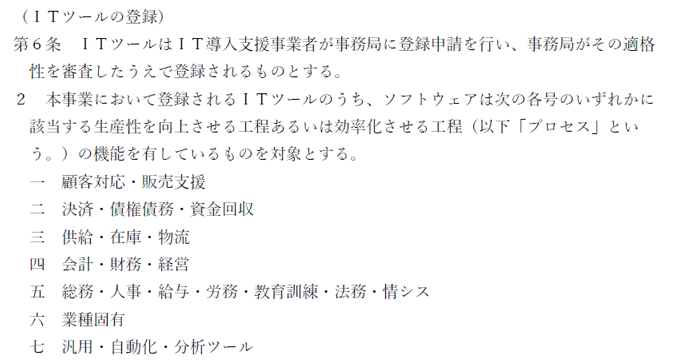
*Excerpt from the Grant Regulations for the Reiwa First Year Supplementary Service Productivity Improvement IT Introduction Support Project Normal Category
If you are applying for this subsidy, you need to prepare and submit a business plan that includes the growth rate of labor productivity after IT implementation.
At the time of the grant application, an examination will be conducted to determine whether the grant will be awarded, but the specific grant amount will be finalized after the completion of the project.
In particular, for Type B, there are more requirements set compared to Type A, such as setting and achieving targets for the increase rate of total salary payments, so be sure to consider carefully before applying.
3. Online Skill Improvement Subsidy
The Online Skill Improvement Subsidy is a grant provided by Tokyo Metropolitan Government and is operated by Tokyo Work Foundation.Eligible businesses can receive subsidies for expenses related to vocational training using e-learning for their employees.
Eligible entities include small and medium-sized enterprises and organizations with their headquarters or offices located in Tokyo. Additionally, it is a requirement that the training for which the subsidy is applied has not already received funding from national or local government bodies.
In addition, for businesses that promote DX within vocational training, a separate "DX Reskilling Subsidy" has been established, and the subsidy amount is different. Therefore, if you are promoting a relevant business, it may be a good idea to consider that as well.
Now, in the online skill enhancement subsidy, even if the price per course is set for e-learning materials, flat-rate participation is also eligible. Additionally, necessary ID registration fees and operational expenses such as managing the course attendance are also covered.
However, please note that materials developed on a custom basis, content unrelated to professions or job duties, and materials consisting solely of language acquisition or exam questions are excluded.
The grant amount is as follows.

*Excerpt from the Online Skill Improvement Subsidy Site for the 5th year of Reiwa
If you receive this grant, you will need to submit a grant application, and if it passes the review, training will be conducted, after which the amount to be paid will be determined.
3. Summary
We introduced the subsidies available for the implementation of e-learning.
If the purpose of each subsidy aligns with your company's training policy, you can expect to enhance your employees' skills while receiving public support.
Some subsidies may have consultation services available, so we recommend taking advantage of them.
Moodle Implementation Support for Human Science
Our company, Human Science, offers implementation support services for the Learning Management System (LMS) 'Moodle'. Since 'Moodle' is open-source, it is possible to keep initial costs low. We provide services ranging from the construction and design of 'Moodle' to customization, plugin development, and operational support.
Features of Moodle
●Management of learning progress and grades
●Rubric evaluation
●Multilingual support
●Customization of appearance
●User permission restrictions
●Management of participant groups
●Regular security updates
We can build an e-learning system that meets the needs of companies looking to implement the most suitable e-learning for their organization. We also offer global human resource development services such as e-learning material production and translation.
>Moodle Implementation Support and Operation
>e-Learning Material Production
>e-Learning Material Translation (Multilingual Support, Localization)
Mito Electronic Technical School | Provision of Online Classes Using Moodle
Due to the COVID-19 pandemic, we provided support for the implementation of 'Moodle' for online classes.
The consultation took place in April 2020, when the state of emergency was declared. We received a request for 'Moodle' because it is open-source, which helps keep implementation costs low, and there is a wealth of information available online, including manuals, along with a strong track record of implementation at universities.
As a specialized school for information processing, it seems that the faculty members did not face any difficulties in using it. Even after the end of the COVID-19 pandemic, a hybrid model with face-to-face classes has become established, and efforts are being made to improve the quality of education.
The case study of Mito Electronic Vocational School is detailed below. Please refer to it for methods of infrastructure development in online learning.
>Realizing the Provision of Online Classes with Moodle: Enabling Class Delivery Even During School Closures












